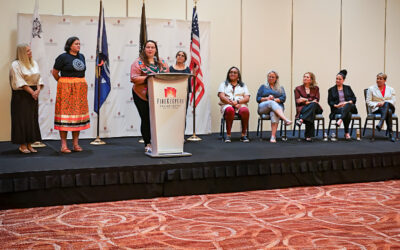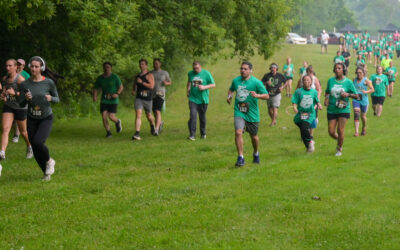Indigenous Chef-inspired Meal Presented to W.K. Kellogg’s Culinary Institute
“Food Sovereignty is completely about community, it brings community together, without food sovereignty we are reliant upon other people,” said Chef Jody Gzhadawsot Mattena, Member of the Citizen Band Potawatomi and NHBP Lifeways Consultant.
In November, representatives of NHBP presented Indigenous dishes through a cooking demonstration and sampling to more than 30 staff of W.K. Kellogg’s Institute, located in Battle Creek, Michigan, in honor of Native American Heritage month.
“We like to not only highlight the up-and-coming trends, but also we like to learn about heritage and culture in the way we know best – through food,” said Kellogg’s Director R&D. MorningStar Farms and Incogmeato, Giovanna Hernández.
Hernandez moderated the 45-minute cooking demonstration led by Mattena and assisted by NHBP Food Sovereignty Coordinator Nickole Keith. The duo cooked up a 3-sisters soup of squash, corn and beans with buffalo meat, Mnomen {Wild Rice} and sunflower oil, garnished with dandelion greens and culinary ash. The pair accompanied the soup with pumpkin biscuits, using finely ground cornmeal as a base and Maple Syrup as a topper.
“The term ‘3-Sisters’ is based on ancient agriculture,” said Mattena. “Our ancestors came up with a genius way to crop-rotate… Corn wasn’t planted in rows, like you see today, but rather mounds. Around the corn you plant the beans, and the beans will grow up the corn. The corn supports the beans, the beans give back to squash by putting nitrogen back into the soil. You plant the squash, one at each mound, to provide the ground cover. Then you plant the fourth plant, the forgotten sister, the sunflower, represented in the oils I am using today. That’s planted around the perimeter of the garden, and that brings in the pollinators and breaks the wind.”
“My mom used to say she would measure with her Indigenous eyes and her heart,” said Mattena as she poured Zhiiwaaboo, Maple vinegar into the mix without using measuring devices, to which the audience chuckled.
Mattena introduced the group to Maple vinegar, procured from Dynamite Hill Farms in L’anse, Michigan: “This is kind of like our specialty; it’s like apple cider vinegar, but sweeter.”
The culinary ash was from juniper berries, but Mattena explained that one could create ash from various plants. She also had advice about procuring and purchasing food items in a sustainable way.
“If you buy Mnomen, make sure it’s from an Indigenous source, so that you’re supporting the honorable harvest, so that we don’t kill out our plant source,” said Mattena.
With the group, Mattena shared her journey of losing 100 pounds by eliminating sugar, dairy and gluten from her diet and eating more of an Indigenous-based diet.
Keith explained how many Native Americans have digestive and health issues related to a colonized diet, citing her family’s health history. “Now we are re-establishing the Indigenous-based diet that was taken away from us; this is also food sovereignty. We support other Tribes and Communities in their efforts toward becoming food sovereign, and we do seed exchanges with them and purchase what food we can from other Tribes. This corn is from the Iroquois Nation.”
Mattena relayed how passionate she was about food and teaching others how to eat better and how this recent development in her career began.
“During the beginning of COVID, my daughter came down with the virus while she was living in Massachusetts, and she had no idea how to make Fire Cider,” said Mattena. “I thought I was just sending her the instructional video on TikTok, but I didn’t realize until afterwards that it was going viral. That made me think, ‘Maybe this is something a lot of people really want to know more about.’”
Both the in-person and online audiences displayed extensive interest in where they could procure, purchase and prepare many of the locally sourced ingredients featured by NHBP, such as the Mnomen, buffalo meat and Maple Syrup.
During the presentation, NHBP Culture Associate Kevin Harris II also shared cultural and historical facts about the Bodéwadmek, Neshnabék and the Three Fires Confederacy. As Kellogg’s team members were an international group of nearly 30 attendees, the brief Bodéwadmi history lesson was appreciated and led to several Cultural-based questions.
“We love and respect all cultures,” said Harris. “If you have any other questions about our People, Culture and history, feel free to visit our Tribe’s website and ask questions on our JotForm. There’s no such thing as a stupid question, only great answers.”
Hernández, who was born and raised in Veracruz, Mexico, greatly appreciated the diversity of Culture presented by NHBP, as it reflects the values of Kellogg’s Institute: “At Kellogg’s, we have Business/Employee Resource Groups, such as ¡Hola!, Women of Kellogg’s, Young Professionals and several more, so that people know that they have a group here, that our employees know they belong here.”
After the presentation concluded, the in-person attendees sampled the two dishes, discussing each dishe’s textures, flavor profiles and the history.
“What I do isn’t a job,” said Keith to the group. “It’s my responsibility to promote food sovereignty, for our health and well-being as individuals and as a Community. I want my people to live a little longer.”
For more information on NHBP Food Sovereignty, please join the Facebook group, where recipes, ideas and events are shared as a Community.




0 Comments